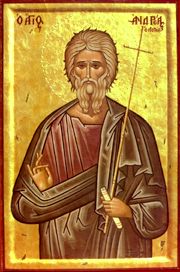Difference between revisions of "Apostle Andrew"
| Line 1: | Line 1: | ||
[[Image:Andrew the First-Called.jpg|right|frame|Apostle Andrew the First-Called]] | [[Image:Andrew the First-Called.jpg|right|frame|Apostle Andrew the First-Called]] | ||
| − | The holy, glorious and all-laudable '''Apostle Andrew the First- | + | The holy, glorious and all-laudable '''Apostle Andrew the First-Called''' was the first of the [[apostles]] of [[Jesus Christ]] and the brother of the [[Apostle Peter]]. He is also the [[patron saint]] of several countries, including Romania and Scotland. His [[feast day]] is [[November 30]]. |
==Life== | ==Life== | ||
Revision as of 17:28, May 24, 2006
The holy, glorious and all-laudable Apostle Andrew the First-Called was the first of the apostles of Jesus Christ and the brother of the Apostle Peter. He is also the patron saint of several countries, including Romania and Scotland. His feast day is November 30.
Life
Andrew was a fisherman by trade, born in Bethsaida. A disciple of John the Forerunner, he left St. John to follow Jesus Christ following his baptism and brought along his brother, the Apostle Peter. Both are numbered among the Twelve Great Apostles. After Pentecost, the lot fell to St. Andrew to preach in:
- Byzantium: he appointed St. Stachys as its first bishop
- Thrace, Peloponnese, Greece, and Epirus: he converted many to the Faith and ordained bishops and priests for them
- Georgia: he entered Georgia from Ajara, preached Christianity in Atsquri, built small church there and left miracle-working icon of Theotokos.
- Russian lands: in Kiev he planted a cross on a high place and prophesied a bright Christian future for the Russian people
St. Andrew was martyred in Peloponnese, in the city of Patras. The Proconsul Aegeates' family believed in the miracles and preaching of St. Andrew, and the enraged Proconsul tortured and crucified St. Andrew. The new converts wanted to remove him from his cross, but the saint would not allow them. Instead, he comforted them from the cross and as he prayed an extraordinary light encompassed him for about a half hour. When it left, he gave up his soul. It was the year 62 AD.
St. Andrew's relics were taken to Constantinople, his head to Rome and a hand to Moscow.
Source
- St. Nikolai Velimirovic, The Prologue of Ohrid
Categories > Church History
Categories > Church History
Categories > Church History
Categories > Church History
Categories > Liturgics > Feasts
Categories > Liturgics > Feasts
Categories > Liturgics > Feasts
Categories > Liturgics > Feasts
Categories > People > Saints
Categories > People > Saints > Biblical Saints
Categories > People > Saints > Martyrs
Categories > People > Saints > Saints by century > 1st-century saints
